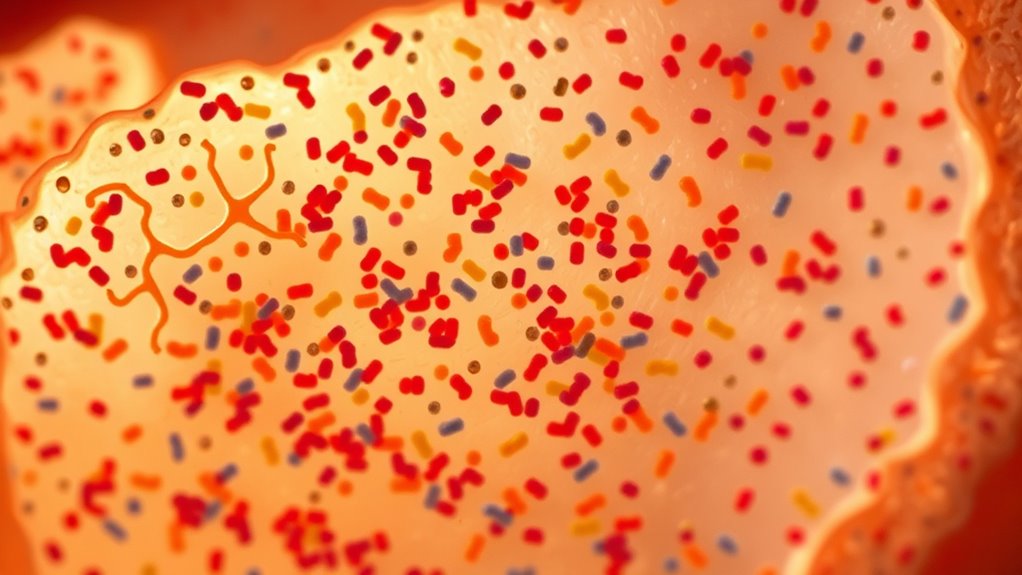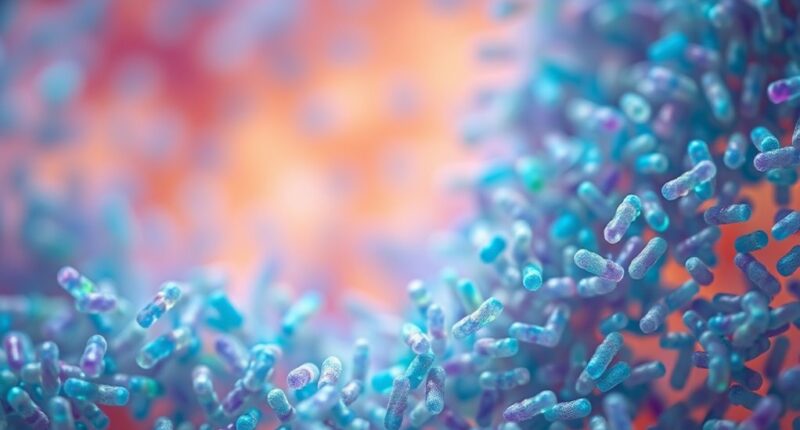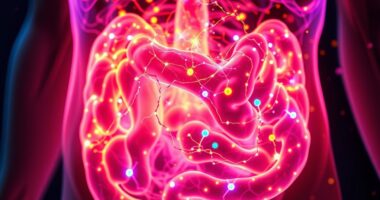The hidden link between gut bacteria and autism symptoms is that a diverse and balanced microbiome supports healthy gut function and brain communication. When this balance is disrupted, it can lead to gastrointestinal issues and influence neurobehavioral traits associated with autism. Probiotics and dietary changes may help restore balance, potentially easing symptoms. If you’re curious about how nurturing your gut bacteria can positively impact neurodevelopment, you’ll discover more as you explore further insights.
Key Takeaways
- Gut bacteria produce neuroactive compounds that influence brain function and behavior, linking microbiome health to autism symptoms.
- Reduced gut microbiome diversity is associated with gastrointestinal issues and behavioral challenges in individuals with autism.
- Imbalances in gut bacteria can impair gut-brain communication, potentially exacerbating social and communication difficulties in autism.
- Probiotics may help restore microbial diversity, improving gut health and possibly alleviating some autism-related behaviors.
- Strengthening gut microbiome health supports immune function and neurochemical balance, impacting overall autism symptom severity.

Recent research suggests that gut bacteria may play a significant role in autism spectrum disorder (ASD). The collection of microorganisms living in your digestive system, known as the microbiome, influences many aspects of your health, including brain function and behavior. One key factor researchers are exploring is microbiome diversity—the variety and balance of bacteria in your gut. A diverse microbiome is often associated with better health outcomes, while limited diversity has been linked to various conditions, including ASD. When your microbiome lacks diversity, it may lead to an imbalance that affects gut health and, consequently, your neurological functioning.
You might not realize it, but the gut-brain connection is powerful. The bacteria in your gut produce neurotransmitters and other compounds that communicate with your brain through the vagus nerve and bloodstream. If your microbiome is less diverse, this communication can become disrupted, potentially influencing autism symptoms such as social challenges, repetitive behaviors, and communication difficulties. Researchers are particularly interested in how probiotic effects—beneficial bacteria taken through supplements or fermented foods—can modify this balance. These probiotics aim to introduce helpful strains that enhance microbiome diversity, restore gut health, and potentially reduce some ASD symptoms.
Studies suggest that improving microbiome diversity with probiotics might lead to better behavioral and gastrointestinal outcomes in children with ASD. For example, certain probiotic strains have been shown to reduce inflammation, improve gut barrier function, and normalize microbial composition. When your gut’s bacterial ecosystem becomes more balanced, it may decrease issues like constipation, diarrhea, or stomach pain, which are common among those with autism. Additionally, these improvements in gut health can influence mood, anxiety levels, and social engagement by modulating neurochemical production.
While the research is still developing, the probiotic effects on gut bacteria are promising. They offer a non-invasive approach to potentially ease some of the core and associated symptoms of ASD. The key lies in fostering microbiome diversity—adding beneficial bacteria to outcompete harmful strains and create a resilient, balanced ecosystem. This process may help improve not only your digestive health but also your overall neurological well-being. Maintaining a diverse microbiome is essential for overall health, as it supports immune function and metabolic processes. As scientists continue to explore this connection, it’s clear that nurturing your gut bacteria could become a valuable part of managing autism symptoms, emphasizing the importance of a healthy, diverse microbiome for both physical and mental health.
Frequently Asked Questions
Can Probiotics Improve Autism Symptoms?
You might wonder if probiotics can improve autism symptoms. While research suggests that increasing microbiome diversity with specific probiotic strains could help, results vary. Some studies show improvements in gut health and behavior, but more evidence is needed. You should talk to a healthcare professional before trying probiotics, as choosing the right strains and understanding individual responses are key to seeing potential benefits.
Are Certain Foods Better for Gut Health in Autism?
Ever wondered which foods boost gut health in autism? You should focus on increasing fiber diversity, which feeds beneficial bacteria and supports digestion. Also, identify and avoid food sensitivities that may cause inflammation or discomfort. Incorporate a variety of fruits, vegetables, and whole grains to promote a balanced microbiome. Isn’t it worth exploring personalized diets that cater to individual sensitivities for better gut health and overall well-being?
How Fast Can Gut Bacteria Changes Affect Behavior?
Changes in your gut bacteria can influence behavior within days to weeks, depending on microbiome stability. When you improve your diet or take probiotics, you might notice behavioral shifts relatively quickly, as microbiome modulation occurs rapidly. However, sustained improvements require consistent efforts. Your gut’s microbiome stability plays a key role in how swiftly these behavior modulation effects happen, with more flexible microbiomes adjusting faster to beneficial changes.
Is Gut Microbiome Testing Reliable for Autism Diagnosis?
Gut microbiome testing isn’t reliable for diagnosing autism yet. You should know that gut diversity and microbiome stability vary greatly among individuals. While testing can reveal some insights, it doesn’t provide definitive answers about autism. Relying solely on these tests might lead to misinterpretation. For now, focus on thorough evaluations from healthcare professionals, as they consider multiple factors beyond just gut bacteria to understand autism symptoms better.
Do Antibiotics Help or Harm Gut Bacteria in Autism?
Ever wonder if antibiotics help or harm gut bacteria in autism? While they can sometimes reduce harmful bacteria, antibiotics risks include disrupting your gut flora, potentially worsening symptoms. Antibiotics may temporarily improve certain issues, but prolonged use risks gut flora disruption, leading to imbalances that could harm overall health. You should carefully weigh these effects, consult your healthcare provider, and consider alternative treatments to support your gut health.
Conclusion
So, don’t dismiss the idea that gut bacteria could influence autism symptoms. Even if it seems unlikely now, understanding this connection might open doors to new treatments and improved quality of life. Remember, small changes in your gut health could make a big difference. It’s worth exploring, because sometimes, the tiniest shifts can lead to the biggest breakthroughs. Trust in the potential of your body’s natural balance to support your journey forward.










